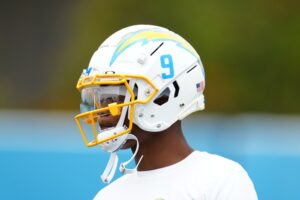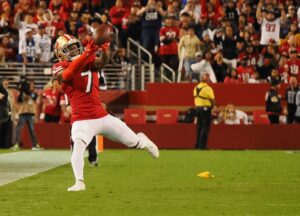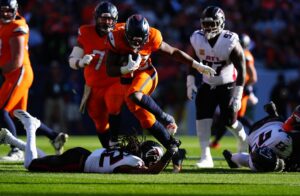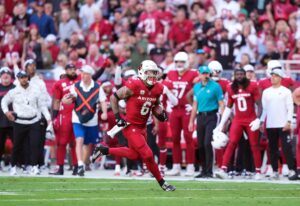The 2018 New Orleans Saints have set themselves up beautifully for a Super Bowl run. Following an impressive 2017 season that ended in heartbreak, the Saints finished this year with a 13-3 record that earned them the top NFC playoff seed. Now they bring one of the strongest teams in franchise history into the playoffs and won’t have to leave the Mercedez-Benz Superdome, where New Orleans has yet to lose in January under head coach Sean Payton.
While this is the Saints best chance to win another Superbowl since their 2009 championship season, this team is far from perfect. Defensively, the Saints weaknesses are crystal clear and their holes on offense are often disguised by Payton’s excellent play calling and the continuing brilliance of quarterback Drew Brees.
Here are four problems the Saints will have to overcome if they want to seize this golden opportunity for another championship.
Four Concerns for the New Orleans Saints as Postseason Begins
Lack of Receiving Options
Michael Thomas is the most productive and reliable target Brees has ever thrown a pass to. His 125 catches and 1405 receiving yards both set new franchise records and his 85% catch rate was the highest ever recorded by a wide receiver with over 100 targets. Thomas has blossomed into a genuine primary receiver that’s capable of taking over games, as evidenced by his six outings of 10 or more receptions this season.
No one will underestimate Thomas when the Saints take the field on January 13th. The same can be said about running back Alvin Kamara, who has already amassed 1,535 receiving yards on 162 receptions in his first two NFL seasons. Behind these two elite NFL talents, however, there are only question marks.
The Saints wide receiver group had great potential this season, but then free agent signee Cameron Meredith and veteran speedster Ted Ginn both suffered severe early-season injuries. Ginn was able to come back in week 16, while Meredith will finish the season on injured reserve. These injuries forced New Orleans to rely on rookie third-round pick Tre’Quan Smith, along with undrafted free agents Keith Kirkwood and Austin Carr, none of whom were really able to seize the opportunity.
The tight end group led by 14-year veteran Ben Watson was unable to fill the void either. Together, Watson, Josh Hill, and Dan Arnold combined for 735 receiving yards and four touchdowns on 63 receptions.
The Saints may end up in some shootouts in the playoffs with the Los Angeles Rams and Philadelphia Eagles as potential foes, both of which boast top-ten passing offenses. The Saints already beat both teams at home this season, but that doesn’t make either team less dangerous. A shootout is even more likely if the Saints end up in the Superbowl as four of the six AFC contenders have top-ten passing offenses.
Brees has been involved in some of the most memorable shootouts in recent NFL history, but will the Saints rag-tag group of receivers be up to the task in a high-scoring playoff situation?
Perhaps the return of Ginn will be enough to open up the Saints passing game again. Ginn isn’t consistently productive, but his presence as a deep threat opens up short and intermediate routes for other receivers and should make it easier for Thomas and Kamara to thrive. In Ginn’s first game back against the Pittsburgh Steelers in week 16, Thomas and Kamara combined for 191 yards on 15 receptions, while Ginn himself added five catches for 74 yards.
Offensive Line Health
Despite holes in the passing game, the Saints offense has thrived for much of the season. The Saints offensive linemen deserve a lot of credit for the continuing success. They allowed 20 sacks all season, the second lowest figure among NFL offenses and helped the Saints rushing offense finish sixth overall.
Aside from a pectoral injury that kept left tackle Terron Armstead out for five straight games, the Saints offensive line had stayed healthy for much of the season. However, injuries have started to pile up in recent weeks.
Armstead’s backup Jermon Bushrod, who played fairly well in the starting role suffered a hamstring injury in week 15. Armstead returned the next week but reaggravated the same pectoral injury early in the game. Starting left guard Andrus Peat then slid over to the left tackle spot and started there in week 17, only to leave the game with a hand injury.
The situation is grim on the other side of the line as well. Right guard Larry Warford missed the regular season finale with a knee injury, along with right tackle Ryan Ramczyk, who had been dealing with a shoulder injury.
Unofficial injury reports put out by local media this week offer little reassurance. Ramczyk was spotted at practice, however Armstead, Bushrod, Peat, and Warford were all absent on Wednesday and Thursday.
Hopefully, New Orleans will have at least half of their starting line available next week. However, it’s likely that young interior linemen Will Clapp and Cameron Tom, or veteran tackle Derek Newton, who played his first game in two years last week, will start in the coming weeks. Fortunately New Orleans doesn’t play this weekend, otherwise, it’s likely all three would have had to start.
Coverage Woes
The Saints final defensive statistics paint a pretty clear picture of their ability to defend the pass this season. New Orleans finished 29th overall in both passing yardage and yards per attempt allowed this season. Opposing quarterbacks combined for a 100.3 passer rating, which was the sixth highest rating allowed among NFL defenses this year. The Saints ranking in both yards per attempt and passer rating allowed ranking are the worst of any team in the playoffs.
To be fair, the Saints faced top-ten passing offenses in seven of their regular season games, and in general, it was a highly productive year for passing in the NFL. Five teams finished the season with over 4,500 passing yards, including the Kansas City Chiefs and Steelers, who both exceeded 5,000 yards. In 2017, no team amassed over 4,500 yards passing.
The Saints also generally played better in the second half of the season. After allowing an average of 311.3 passing yards in their first eight games, they held opponents to 226.3 passing yards per game in their final eight games. There were still two troubling games during that stretch though. New Orleans surrendered 340 passing yards in their second matchup with the Atlanta Falcons and allowed 364 yards passing against the Steelers.
These two games seemed to reveal a pattern that I touched on last week: the Saints pass defense struggles the most when facing an opponent with two high-quality receivers. Atlanta’s duo of Julio Jones and Calvin Ridley and Pittsburgh’s combination of Antonio Brown and JuJu Smith-Schuster both amassed over 230 receiving yards. The talented receiving duos of the Tampa Bay Buccaneers, Minnesota Vikings, and Rams all had big games against New Orleans earlier in the season.
Fortunately, most of these teams missed the playoffs.
History of Late-Game Postseason Collapses
In the 2010 playoffs, New Orleans allowed Seattle Seahawks running back Marshawn Lynch to execute one of the most impressive runs in NFL history that gave his team a two-score lead late in the fourth quarter.
A year later, the Saints held a three-point lead over the San Francisco 49ers in the Divisional round with 1:32 remaining. Quarterback Alex Smith executed an unbelievable game-winning drive and eliminated perhaps the most talented team in Saints history.
Then last year, the Vikings defeated New Orleans with a Stephon Diggs touchdown on the final play of the game.
One could dismiss these missed opportunities by pointing out that all three incidents took place on the road, and that it won’t be an issue this year with home field advantage. Maybe the Saints are in a better position to win those games if they were played in the Superdome, but I don’t think the lack of discipline in those moments can be blamed on the venue.
Like it or not, this is a recurring theme. These last-minute letdowns ended three of the Saints six trips to the playoffs under Payton. Whether you blame the venue, poor individual efforts, the defenses as a whole, or coaching for those incidents, you cannot rule out the possibility of it happening again this year.
Why the 2018 Saints Can Win the Superbowl
History aside, I think the resilience of the 2018 Saints is why they avoid any late-game letdowns in the postseason and win another championship. They have done a remarkable job thus far of winning despite their shortcomings.
Despite some holes on offense, New Orleans finished third overall in scoring and Brees is an MVP candidate. A three-point loss to the Cowboys was the only game where a lack of offensive weapons appeared to cost them a win.
Sure, the Saints struggled against talented passing attacks, yet the only game they lost against a top-ten passing team was way back in week one against Tampa Bay. The relentless run defense has forced opponents to try and beat New Orleans with a one-dimensional approach. Despite some big passing numbers, those efforts have proven mostly unsuccessful.
No matter what opponents lie ahead, New Orleans has proven they’re strong enough to overcome their weaknesses.
Main photo:
Embed from Getty Images






